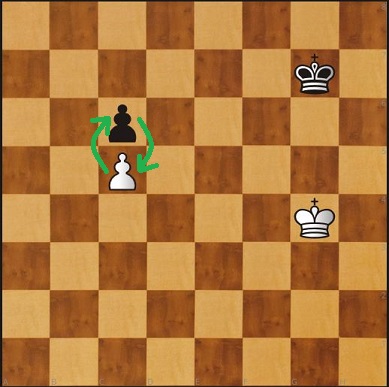File Sharing Chess
Tactical possibilities are an important part of chess and why we enjoy the game. This author has invented a rule which would create more dynamic interaction between enemy pawns and hopefully limit the draws occurring from "closed" positions.Rules
It has the same rules as chess except for this one added option: the "pawn swap." When a player's pawn is directly in front of an enemy pawn with no squares in-between (such as a "fixed pawn" in standard chess), the player may swap his or her pawn with that particular enemy pawn, after which they can each continue on that file: This move would therefore be an option to either player whenever the pawns are "butted up" against one another (with one exception shown below). Unlike en passant, the pawn swap move would not be a requirement right away.
One exception: pawn swapping is illegal if the enemy pawn is threatening a piece (or even a pawn), as shown here:
This move would therefore be an option to either player whenever the pawns are "butted up" against one another (with one exception shown below). Unlike en passant, the pawn swap move would not be a requirement right away.
One exception: pawn swapping is illegal if the enemy pawn is threatening a piece (or even a pawn), as shown here:
Notes
The primary purpose of this added rule is to limit the number of draws that are caused by "closed/locked up" games. In my opinion, the winner of the game in such instances should be the player who took advantage of tempo (whose pawn(s) are closer to promotion). There are of course other effects of including this option, but an important aspect is that it would not be used all the time. For example, when enemy pawns are facing each other on the 4th and 5th ranks, the player who makes this pawn swap move would be losing a tempo in the pawn race to promotion. This means pawn swapping isn't so powerful that it becomes the only focus of the game. As stated, pawn swapping is mostly intended to add more tactical, dynamic possibilities, especially "closed" games as shown in the following example: In this diagram above, it would be a draw in standard chess, but Black can take advantage of his/her more advanced pawn on the F file (then on the C file when the white king tries to stop it)
As stated previously, pawn swapping usually does not supercede the important principles of chess, such as activating the king toward the end game:
In this diagram above, it would be a draw in standard chess, but Black can take advantage of his/her more advanced pawn on the F file (then on the C file when the white king tries to stop it)
As stated previously, pawn swapping usually does not supercede the important principles of chess, such as activating the king toward the end game:
 -
-
-
Above you will see that in both game types, black wins thanks to having a more active king near the pawns. Next we will show some draws in standard chess that become wins in File Sharing Chess:
-
-
-
-
-
Above you will see that in both game types, black wins thanks to having a more active king near the pawns. Next we will show some draws in standard chess that become wins in File Sharing Chess:
-
-
 -
-
In this example, both players have failed to activate their kings, but White has better tempo regarding his/her pawns. White can win using the pawn swap rule with the move c6/s, and Black can take. Then White takes the c5 pawn and Black cannot catch the inevitable promotion after another c6/s move by White. It is a rule that gives him/her advantage but not does supercede the "active king" principle as shown in the following example:
-
-
-
-
In this example, both players have failed to activate their kings, but White has better tempo regarding his/her pawns. White can win using the pawn swap rule with the move c6/s, and Black can take. Then White takes the c5 pawn and Black cannot catch the inevitable promotion after another c6/s move by White. It is a rule that gives him/her advantage but not does supercede the "active king" principle as shown in the following example:
-
-
 This 'user submitted' page is a collaboration between the posting user and the Chess Variant Pages. Registered contributors to the Chess Variant Pages have the ability to post their own works, subject to review and editing by the Chess Variant Pages Editorial Staff.
This 'user submitted' page is a collaboration between the posting user and the Chess Variant Pages. Registered contributors to the Chess Variant Pages have the ability to post their own works, subject to review and editing by the Chess Variant Pages Editorial Staff.
By JT K.
Web page created: 2016-07-08. Web page last updated: 2016-07-08
